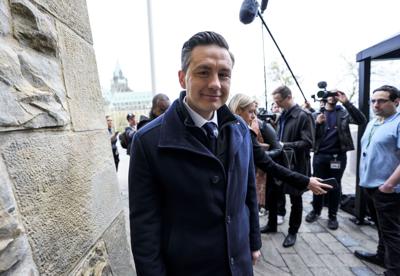OTTAWA—Conservative Leader Pierre Poilievre is defending his party’s performance at the polls — though admitted there are lessons to be learned — as his caucus convened on Parliament Hill Tuesday to chart its next steps after an election defeat that also saw their leader lose his own seat.
“We have to ask ourselves, how do we, first of all, keep the enormous number of the 8 million people who voted for us, that were ... almost two-and-half-million more than the previous time, but then add another, roughly, million votes that will allow us to get over the finish line,” Poilievre said in his first public remarks since his election night concession speech.Â
“We have to spend a lot of the summer listening carefully to people, in the communities, coffee shops and town halls and other events (so) we can find out who are the people that are most likely to join this growing movement and get us over the finish line.”
Those are among the questions expected to surface in Tuesday’s meeting, the first gathering of the party’s caucus since the Conservatives blew a sizable precampaign lead in the face of Mark Carney’s Liberals, but also expanded their presence in the House of Commons by more than 20 seats.Â
But there are also more pressing matters set to be addressed, such as whether Poilievre needs to make changes to his campaign team, who should lead the Official Opposition in the lower chamber, and whether the seatless leader should remain at the party’s helm.
Tuesday’s meeting is being held, in part, to carry out provisions outlined in the Reform Act, which was championed by Conservative MP Michael Chong more than a decade ago and came into effect in 2015. The Reform Act allows party caucuses to decide whether to adopt four powers set out by the law; one of those powers is the ability to launch a leadership review if at least 20 per cent of a party’s caucus wishes to do so, at which point a leader can be removed if a majority of members vote to oust them via secret ballot. Should that happen, another power allows caucus to conduct a secret ballot vote to select an interim leader.
The Conservative party chose to adopt the powers after the 2021 election, which eventually led to former leader Erin O’Toole’s ouster in 2022, paving the way for Poilievre’s successful leadership run later that year.
There have been no public calls for Poilievre’s ejection as leader thus far, with several MPs expressing support Tuesday for his continuation in the role.Â
“Any time that you don’t form government, you have to look at why,” said former leader and Conservative MP Andrew Scheer, who told reporters Poilievre had brought scores of new voters into the blue tent and said that after a review of the party’s showing, he was “confident our leader Pierre Poilievre will be able to make some adjustments to finish the job next time.”
Scheer also said Jenni Byrne, Poilievre’s campaign manager who faced criticism from some in Conservative circles for running a tightly-controlled campaign, did a “great job” and “grew our seat count in many areas of the country.”
Bernard Généreux, a Quebec MP re-elected last week, said Conservatives need to be humble while they analyze why they lost. “We’ll do an analysis with (Poilievre) on the election and we will ... suggest a different approach to do even better next time,” Généreux said in French.
Dominique Vien, another re-elected Quebec Tory, said the caucus stands behind Poilievre, who she expects will be in listening-mode for Tuesday’s meeting. “It’s not for nothing,” that the caucus was meeting, Vien said.
Quebec MP Luc Berthold added that he expected good discussions but declined to say whether Poilievre should change the personnel around him, including his longtime ally and strategist Byrne. “We lost, so it’s obvious we need to change things,” Berthold said.
For his own part, Poilievre said Tuesday that while Byrne worked hard and that his team has “a lot to be proud of,” he will be expanding his team.
“That’s one of the things we’ll be talking about today in our caucus,” Poilievre said.Â
While the Conservative leader lost his seat in Carleton, the Ottawa-area riding he represented for more than 20 years, Poilievre has indicated he intends to run in a yet-to-be-called byelection in Alberta’s Battle River—Crowfoot, after incumbent Conservative MP Damien Kurek announced he would vacate his handily-won seat.
In a video posted on social media on Monday that appeared to be filmed in the riding, Poilievre said he needs to “learn and grow” following his defeat.Â
He said Tuesday that he now has “a path back into Parliament to allow me to hold the government to account” that would allow him to continue to advance his mission “to give people back control of their lives.”
”That was the mission that I set out to when I started my leadership campaign back in 2022,” Poilievre said. “It’s the mission that we stay focused on today.”
Error! Sorry, there was an error processing your request.
There was a problem with the recaptcha. Please try again.
You may unsubscribe at any time. By signing up, you agree to our and . This site is protected by reCAPTCHA and the Google and apply.
Want more of the latest from us? Sign up for more at our newsletter page.


























To join the conversation set a first and last name in your user profile.
Sign in or register for free to join the Conversation